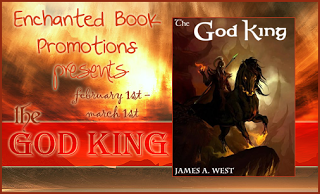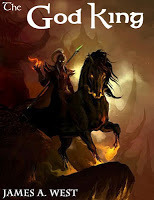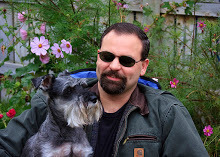Of Gods and Kings and the World of Fantasy
 I reviewed James West's The God King last week (see review of the God King by James West), and today I'm privileged to have him here on my blog answering some interview questions. I really enjoyed this interview and learned a lot about what goes into writing and creating fantasy. I'm sure you'll enjoy the interview too, and don't forget to leave comments and ask your own questions at the end.
I reviewed James West's The God King last week (see review of the God King by James West), and today I'm privileged to have him here on my blog answering some interview questions. I really enjoyed this interview and learned a lot about what goes into writing and creating fantasy. I'm sure you'll enjoy the interview too, and don't forget to leave comments and ask your own questions at the end.Thank you for visiting my blog James. Let's talk epic fantasy...
 Whichfantasies have you most enjoyed reading, as a child and as an adult? Do youthink they influenced you in writing the God King?
Whichfantasies have you most enjoyed reading, as a child and as an adult? Do youthink they influenced you in writing the God King?First let me say how much Iappreciate you setting up this interview and the opportunity it provides me totalk about what I consider my realwork! Thank you!
Now to the nitty-gritty. The firstbook I ever read that even smacked of the fantastical was the Talisman, by Stephen King and PeterStraub. The first traditional fantasy I ever read was The Eye of the World, by Robert Jordan. Although I have since readquite a few fantasy-type novels, these two rank high on my list of favorites.To make it an even three, I will add George R.R. Martin's, A Game of Thrones. As far as influence goes, Stephen King willalways hold a special place in my heart. For me, he is one of those few authorswho can write about something that means absolutely nothing to me, yet still drawme into the story, compel me to keep reading, and leave me feeling satisfied.That is the kind of writer I aspire to become.
I have the same aspirations, and I'd say the God King did indeed compel me to keep reading. Is fantasyyour favorite genre to read? To write?
I love writing fantasy. It has somuch potential, and is so full of what ifideas, that I never get tired of it. As far as reading, there is so much toread across so many genres that I only get around to one or two fantasy titlesin a given year.
You inventsome fascinating civilizations in your novel. Are they modeled on anyparticular people or places? Where would you say they were most like?
As I mentioned, the cool thing aboutfantasy is that it's a genre that allows authors and readers the unfetteredexploration of the idea of what if.When I began setting up the world in which TheGod King would take place, I was looking at ancient cultures of the MiddleEast, the Greeks and Romans, and the Germanic tribes. I wondered what wouldhappen if I smashed all those separate epochs and peoples together. In short, Isuppose my civilizations are modeled after real peoples and eras. But as afantasy writer, I let my imagination mix together and render down all theinformation I had absorbed in research, and what came out were cultures thatare familiar in some respects, but wholly fictional in others. That said, thereis no question that I set the story of TheGod King in a realm flavored by the ancient Middle East.
 When youcreate your characters' names, do you base them on a real-world language? Doyou hear the sound of the name before you work out how to write them? Does itworry you that readers might not pronounce the names "right?"
When youcreate your characters' names, do you base them on a real-world language? Doyou hear the sound of the name before you work out how to write them? Does itworry you that readers might not pronounce the names "right?"When I first started writingfantasy—2002-2003—I knew I wanted to tell stories that took a step away fromEuropean settings, and knew I would need to come up with different/appropriatesounding names and places. With that in mind, I discovered a great andinvaluable resource in online name generators. I made a list of literallythousands of names, all based on real world languages. Taking it a stepfurther, when I look back over that list, I pick a name that soundsinteresting, then add or subtract a few letters, and maybe toss in someapostrophes and hyphens for visual effect. Generally I like to make a namesound just like it looks. As far as worrying over a reader mispronouncing thosenames, it never crosses my mind. I know for myself that I have read a lot oftruly outlandish names in various books, and I find that my brain automaticallyretranslates the tongue-twister/brain-teaser name into something that works formy reading pleasure.
There aresome visually spectacular scenes throughout this book. If it was being madeinto a movie, which scenes would you want to be most sure were replayedcorrectly?
That is a tough one, because I wouldwant all of them done right :) Some of my favorite scenes follow: when Varisfirst encounters Peropis in the Thousand Hells; when Ellonlef sees andexperiences the aftermath of the release of the powers of creation; the entirescene when Kian, Azuri, and Hazad encounter Lord Marshal Bresado under theBlack Keep; when Varis discovers that his army is not what he thought theywere, and the steps he takes to rectify that situation…. I could go on, but Ido not want to bore everyone, or give too much away!
Reading your answer brings those scenes back to mind for me. I think I'd like this movie. Meanwhile, are themarshes based on somewhere you've been? What about the cities?
My family moved around a lot when Iwas growing up, so I spent time in Northern California and all over Oregon. Ilived in Southeast Alaska for a time, as well as North and South Carolina, andFlorida. When in the Army I was stationed in Hawaii—I was in the infantry, so Ispent a lot more time sweating in the jungle than on the beach—which also tookme to Australia and Haiti. For a year after the Army, my wife and I decided toearn some extra college money by driving eighteen-wheelers. Logging close to a 1,000miles a day as a team, we literally drove over nearly every mile of interstateAmerica has to offer. After college we spent a year in New Mexico, beforefinally coming back to Montana. With all that in mind, I would say the closestthing to a swamp/marsh experience for me was a month spent in Fort PolkLouisiana, and the countless times I drove back and forth across the deepsouth. As far as cities, I would say they come from research andimagination.
You use thenumber three a lot—three gods, three moons, three men marching together… and,of course, people often talk of stories having three parts—beginning, middleand end. Did you use the number three as a deliberate symbol or do you thinkthere's something in us that naturally gravitates towards that number?
Until I read that question, I hadnot considered that the number three showed up so many times. If there is anysymbolism there, it was not intentional. I have to admit, I am curious as towhere and how I will use that number in the future. Of course, for me thatuncertainty, constantly wondering what if,is one of the most alluring things about writing fiction. I cannot tell you howmany times I intended the story to go one way, only to have it take off on itsown, leaving me to hang on for the ride. That is where things can get tricky,because I want to see where it will go, but I also know I have to stay ontask.
I reallyenjoyed the dialog between Kian, Azuri and Hazad. Did you model them on realpeople?
The best short answer I can give isto say yes and no. The more accurate answer is that when I am writing it allbecomes real to me—people, places, and situation—so much so that when I amreally steaming along, what I see outside my window becomes the fake world. Ihave gotten used to that, but when I first began writing I found it ratherunnerving to head out to the grocery store after a few hours of writing. Iwould get the strong impression that the people picking over the fruit andvegetables were not people at all, but some strange, alien race … of course,writers are not the only people who believe aliens are everywhere :)
The long and short of it is this:When I am writing, I immerse myself in the story to the point that I begin tobelieve the story and its people exist in a real time and place. They live outtheir lives on a world that is a shadow of our own, spinning around a distantstar in some fantastic parallel universe.
The God Kingflows very naturally from one location to the next. Did you plot the wholestory before writing it or did it shape itself that way?
I usually do a rough outline, withbullet points serving as guideposts. But as I touched on earlier, the story alwaysends up taking over. Experience has taught me to keep a light but steady handon the reins. If I give the story its head it will gallop off, and thoseseparate bullet points have the potential of turning an otherwise tight storyinto a rambling series of events that fail to drive the plot. If I am too firm,my writing loses vitality, color, becomes formulaic. The cool thing is that ifI end up somewhere really interesting, I can cut it from the current project,then explore it in depth in another. In that, I do a lot of recycling :)
Do you seeany analogies between human creativity and the creative forces wielded by Varisand Kian?
I am not sure I can reasonablyanswer that, but I'll give it a shot. Ultimately I intended to introduce apower into their world that, left to itself, is neither good nor evil. As theseries continues, the underlying conflict is: What will humankind do with thatmuch unbridled power? Can good prevail over the evil that will surely come? Orwill that godlike power, coupled with the imagination and aspirations of theheart, corrupt and ultimately destroy humanity?
Now I really want to read more. What a great theme for the series. So, my final question: Is there something I've forgotten to ask that you'd really like to answer?
I'd love to share a bit of my newwork with you.
Here is a short blurb about myupcoming book! If anyone wants to read the first chapter for free, they canvisit my blog at http://jamesawest.blogspot.com/2012/02/crown-of-setting-sun.html
The Crown of the Setting Sun, the second novel in The Heirs of the Fallen series, is a story set almost two hundredyears after the Upheaval, the cataclysm that unfolded during The God King. An age of darkness cloaksthe world and the Faceless One risen to power, using legions of Alon'mahk'lar, the Sons of the Fallen,to ensure absolute dominion over what little remains of humankind.
Among humans, the people of Izutarare hunted and chained, and seem to have no other purpose than enslavement. Allthat begins to change when an old man of mysterious origins sacrifices his lifeto allow his grandson, Leitos, to escape the mines, the only home he has everknown. Freedom from a life of subjugation, however, is not the blessing itfirst seems.
Weak and alone in a world beset bywalking nightmares, in a world where he can trust no one, Leitos must abandonhis ingrained, timid nature and grow strong and cruel in order to survive.Charged by his grandfather to seek a fabled order of warriors, Leitos fears theexistence of the Brothers of the Shadow Blade is but a dying man's blind hope …a hope frail as morning mist caught beneath the crushing heat of the desertsun.
Thank you James. I shall look forward to reading Crown of the Setting Sun. And I've really enjoyed having you visit my blog.
Published on February 27, 2012 02:57
No comments have been added yet.



